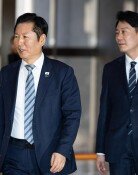[Focus] Bush unlikely to cut troops in Korea
[Focus] Bush unlikely to cut troops in Korea
Posted January. 15, 2001 12:25,
U.S. President-elect George W. Bush referred to the question of reducing the number of American troops on the Korean Peninsula in an interview Sunday with the New York Times, drawing a keen concern from the parties¡¯ concerned background of the remarks.
Colin Powell, nominated as secretary of state in the incoming Bush administration, said Dec. 16 that the United States would review the deployment of U.S. troops dispatched abroad. But the former chairman of the Joint Chiefs of Staff was interpreted as having made such remarks with the U.S. forces in Bosnia and Kosovo in mind.
It is also somewhat unusual that the question of reducing the U.S. troops stationed in South Korea was raised suddenly in that Bush has stressed the U.S. commitment to the security of Korea, based on the traditional line of the Republican Party.
But Bush put a considerably strict precondition that the U.S. troop cut should be considered only in consultation with South Korea and other Asian allies such as Japan after the tension is alleviated on the Korean Peninsula.
Therefore, it can be interpreted that Bush would not reduce the number of American troops stationed here before North Korea¡¯s military threats vanish substantially.
His remarks that American troops on the Korean Peninsula and in Japan were contributing to stability in Northeast Asia also are interpreted as indicating that the new U.S. administration would not curtail troop numbers in South Korea unilaterally, as in the reduction of U.S. forces on the Balkan Peninsula.
Above all, Bush apparently asserted a fundamental position that he would set and promote the alleviation of tension on the Korean Peninsula as the policy goal of top priority, and then would examine the questions of U.S. troops here such as their role and size, according to the analysis of diplomatic experts in Washington.







